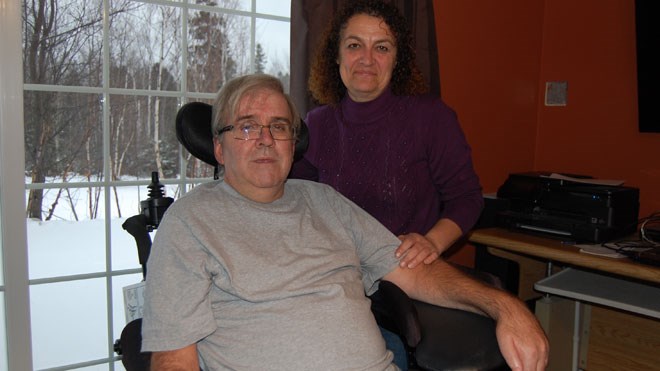For most of his life, Mike Prevost was a provider.
He provided for his family, and as a small business owner, he also provided for the employees who worked at his automotive business.
But four years ago, Prevost's days as the family bread-winner came to an abrupt end. It started with cramps in his arms and hands, and a loss of strength. His family doctor told him he had carpal tunnel syndrome.
When Prevost visited a surgeon, he learned his doctor's diagnosis was wrong, and was referred to a neurologist. In 2011, two years after his initial cramps, Prevost learned he had amyotrophic lateral sclerosis (ALS), a condition more commonly known as Lou Gehrig's disease.
"I had never heard of it," Prevost said.
According to ALS Canada, an organization that funds ALS research and helps support people who have the disease, even many health-care professionals are unfamiliar with the disease.
ALS is a motor neuron disease that causes muscle atrophy throughout the body. On average, when a person is diagnosed with the disease they have three to five years to live. Some people make it to 10 years or beyond, in a near vegetative state, but those cases are rare.
ALS Canada has identified 1,100 people with the disease in Ontario. About 65 of them live in northeastern Ontario.
Today, Prevost cannot move his arms. He can walk about 20 feet before his muscles give in. He spends most of his time in a special chair in his living room, where he watches television.
When he travels, mostly for doctors' appointments, it is in a $25,000 electric wheelchair.
"The first year I got really sick I tried to keep it going, but it got to the point where I couldn't supervise, I couldn't drive anymore," Prevost said.
He was once the person his wife and children depended on, but now he can't even take a drink without assistance.
"At one time, I was helping. We would do things together," Prevost said. "I can't contribute anything. I just drain them."
Prevost's wife, Gloria, is his primary caretaker.
On Nov. 25, she got home at around 3:30 a.m., after working a night shift as a cleaner in one of Vale's office buildings.
She had about four hours of sleep before she woke up to shower her husband, dress him, and prepare his morning coffee.
"We can't leave Mike alone anymore," she said. "It's surprising in a day how many hours I spend just caring for him."
After the morning routine, she helped Prevost into his wheelchair and drove him to the hospital for some tests.
Prevost cannot move his arms, but he still has feeling. To avoid intense pain in his joints, Gloria must move and massage his limbs several times a day.
Gloria has accepted her role as her husband's primary caretaker, but said she misses their outings to Red Lobster.
ALS Canada has estimated a family caring for a loved one with ALS will spend about $150,000 during that person's lifetime.
Brigitte Labby, ALS Canada's regional manager for northeastern Ontario, said the organization has programs to help families procure expensive equipment, but the costs can still be astronomical.
After his diagnosis, Prevost spent $150,000 to convert a carpenter's shop, next to his large brick home, into a small bungalow.
He would have had to destroy many of the renovations he had made to his home to make it wheelchair accessible, and the stairs were too much to conquer.
Prevost's daughter now lives in the large house next door, and often helps with his care.
He said caregivers for family members with ALS do not receive enough support from the government.
"I spent 35 years of my life supporting families. I had employees, they worked for me and I paid plenty of taxes," Prevost said. "Now all of a sudden I need help, and what do I have? My wife working, cleaning offices to try and support the family. That's not fair."
Prevost said the sacrifices his wife and children have made to care for him have been too great at times.
"The time she (Gloria) is spending taking care of me she could be working, making money, or enjoying life," he said. "I think it's more of a struggle for my wife and kids.
"Life is over. When you realize you have something like this, it's over."
